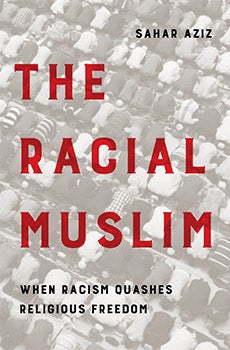Reviewed by Moses Biney, Department of Sociology
The Racial Muslim by Sahar Aziz, a professor of law at Rutgers University Law School, interrogates how and why the United States of America, a country where religious freedom is a founding principle in law and societal norms, produces overt prejudice and discrimination against Muslims. “Muslims in the United States have found religious freedom in practice more myth than reality,” she writes (25).
According to the author, immigrant Muslims are classified both by their race and their religion, to create a “racialized Muslim” identity. That is, racism intersects with religion to racialize a religion’s followers, thereby excluding them from enjoying the benefits of religious freedom guaranteed to the dominant white Judeo-Christian culture.
Aziz traces the historical treatment of African Americans, Native Americans, Jews, and Catholic immigrants from Europe to show the American practice of racializing religion. She adds that classifying people by their religious affiliation is grounded in an American national identity shaped by Protestant settler colonialism, xenophobia, and anti-Black racism.
Historical European hostility towards Islam, which influenced America’s early settlers, combined with racism towards Blacks and other minority groups led to the racialization of Muslim immigrants during the 20th century. Hence, the September 11, 2001, terrorist attack did not create “the racial Muslim”, but it accelerated and deepened an ongoing process.
Provocatively, Aziz suggests that as Muslim immigrants confront Islamophobia, they are faced with the choice of accepting “the racial bribe.” They can either seek “mobility toward Whiteness or engage cross-racial alliances to end systemic racism grounded in Judeo-Christian supremacy” (191). Muslims who realize that their racialization is built on years of religious oppression and anti-black racism attempt to destroy the racial and religious hierarchy from its roots in their quest for equality.
In concluding the book, the author projects that Whiteness may be socially reconstructed around an Abrahamic national identity to encompass groups that are not currently within its realm. Ultimately, however, Aziz calls for an era where no one religious group is overrepresented in the halls of power with economic and political elites in the United States.
The book raises important questions on the intersection of race and religion and how religious minorities may be affected. It opens a conversation about the extent of religious freedom in the United States, who benefits from it, and those who do not. The book’s historical approach makes it readable and approachable to a general audience.

